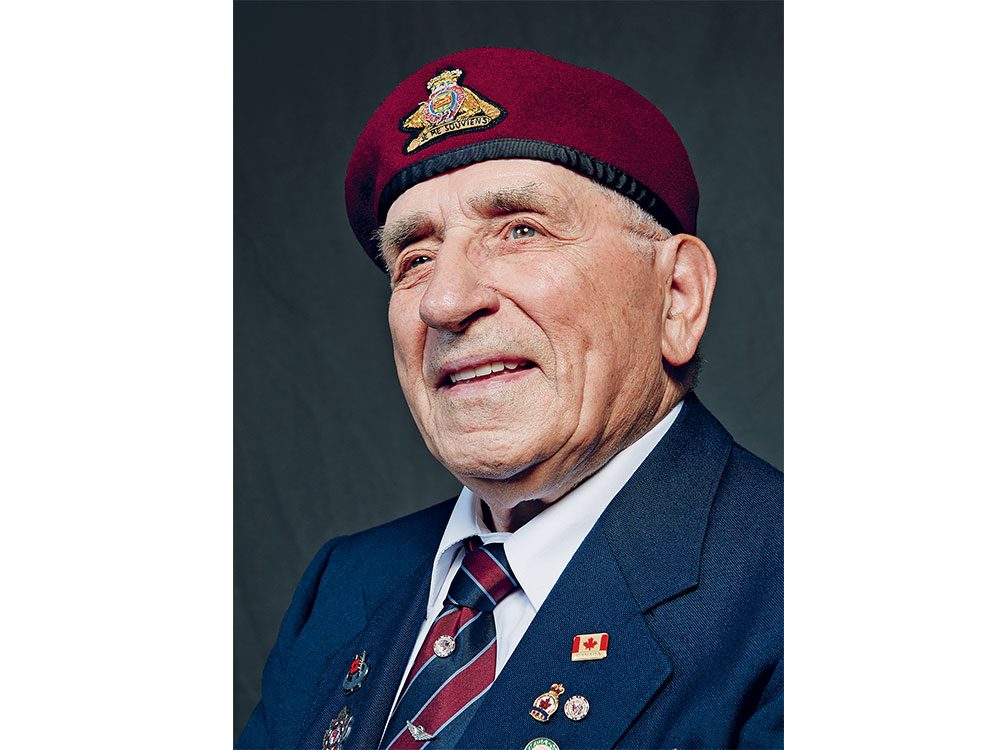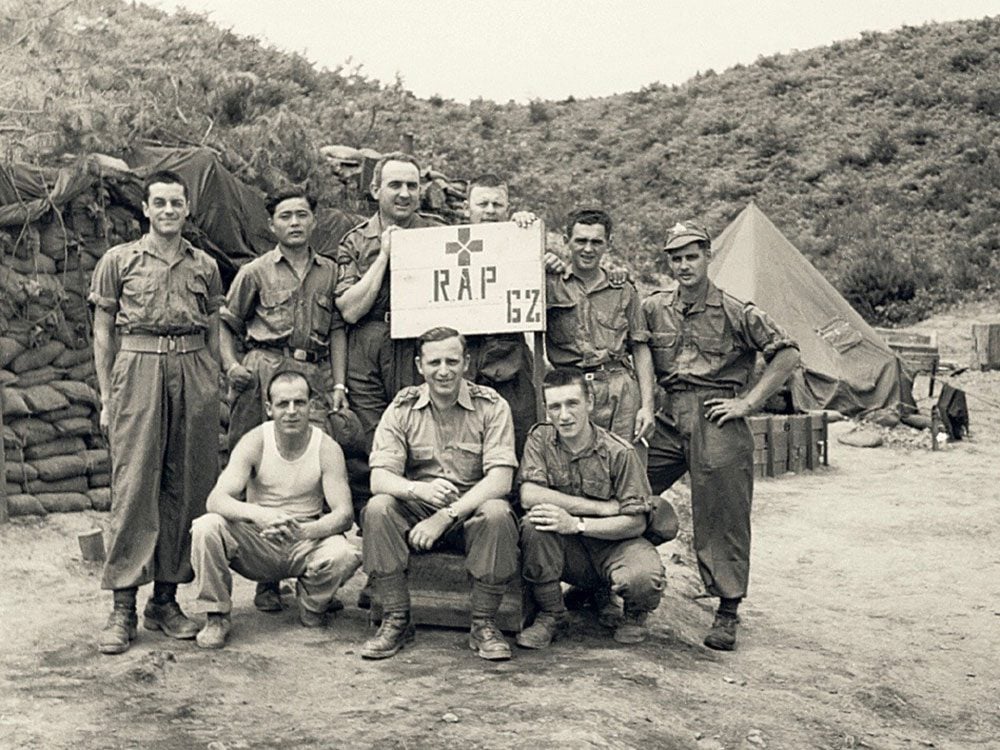
Alphonse Pelletier, the peaceful soldier
Alphonse Pelletier was weeks from the front lines when he realized he’d never be able to kill anyone.
The private, a soldier in the Royal 22e Régiment, had enlisted in the Canadian Army on November 28, 1949, at the age of 19. On that day, he hadn’t been thinking about guns or war or the possibility of shipping out to the Korean Peninsula. He’d been thinking about friends, about family, about belonging.
The army had given him, a lonely youth, a place to land. After two and a half years of training and teaching, it had become his home. Now he would have to exercise his conscience and risk it all.
The Vingt-deuxième was founded in 1914 and was Canada’s only French-speaking unit in the First World War. Almost four decades later, it set off for East Asia, one of three Canadian infantry regiments to defend democratic South Korea against invading North Korean and Chinese forces. Colloquially referred to in English as the “Van Doos,” an anglicized pronunciation of “vingt-deux,” the battalion could be recognized by its beaver insignia and regimental motto, “Je me souviens.” Its members were also famous for their bravery—and bravery’s close relative, rowdiness.
Young Alphonse Pelletier was just about as far from rowdy as one could get. Born the last of six boys in Trois-Pistoles, Que., he had moved around a lot as a child: to his maternal grandparents’ home after the death of his father, to an orphanage following his mother’s permanent hospitalization for memory loss, to an agricultural college when he was 12 years old. At 16, no longer a ward of the state, Pelletier worked as a farmhand in summer and, come winter, in lumber camps as a cook’s assistant. This peripatetic and often solitary existence made him crave company. He found himself missing the camaraderie of the orphanage and the support he’d gotten there. “It seemed to me that, in life, one needs a gang. That’s why I enrolled,” says Pelletier. For him, it was as simple as that.
In short order, the lanky, baby-faced teen earned the affectionate nickname “Ti-Père” (“Little Father”) for his serious manner and his stance on drinking and gambling (fine for his fellow soldiers, but not for him). Come payday, before settling in for a protracted session of beer and cards, his buddies would each hand him $20 they’d put aside. Quietly sipping on a Coke or a 7-Up, Pelletier would hang on to their money until the morning, when he could discreetly hand them back their funds in the sober light of day. “I had a good reputation. I had friends,” says Pelletier. “Enrolling did me a world of good.”
A member of the Vingt-deuxième’s first battalion, Pelletier trained as a parachutist and got his wings in June 1950. He was then asked to teach those same skills to new recruits before sending them west to Vancouver for further training and south to Seattle to board boats headed for Korea—a trip Pelletier and his cohort would take in 1952.
As his departure date grew closer, Pelletier became increasingly preoccupied: “I started to think it over. Target practice is one thing—not a problem. But aiming and shooting at a person, or killing them, is something else altogether.”
He began by talking about his concerns with his brothers-in-arms. They liked and respected Ti-Père, and his moral quandary rang true, but they were well aware that a refusal to follow orders was a ticket to prison. Pelletier knew it too, but he also knew he couldn’t keep his convictions a secret from his superiors. When he did bring his dilemma to their attention, the conversation went as expected.
Detention it would be.
Find out how Cree code talkers from Alberta helped win World War II.

Pacifism on the front lines
If no charges are laid within 24 hours of imprisonment, a soldier must be released—a fact Pelletier was quick to mention to the sergeant on duty come morning. But Pelletier’s overnight stint in the brig had served a double purpose for his superiors, as it had given them time to mull over his case. Their conclusion: the insubordinate private would have to fight. And they’d clearly need to send in their most persuasive advocate to explain that to him.
Pelletier’s first visitor was the military chaplain, known as the padre. He took a hard line immediately, calling the young soldier a coward, a traitor, a bad friend. Had he really thought this through? How could he be okay with letting down his battalion? Pelletier knew the padre—he’d helped him serve mass and had gone to him for confession. He decided to be equally frank. “Would you kill, Padre?” he asked the older man. “Would you kill someone on the other side?” He explained that just as the padre’s vocation and faith prohibited the priest from killing, his own Catholicism kept him from doing so.
It was a very short conversation—chastened, the apologetic padre sent Pelletier off to the battalion’s commanding officer to argue his case.
Lieutenant-Colonel Louis Frémont Trudeau had taken charge of the Vingt-deuxième in 1949, following six years in Great Britain and on the grinding Italian campaign during the Second World War. When faced with the insubordinate private, his first question was, “Is this because you’re scared?”
“I mean no disrespect, Commander,” answered Pelletier. “I know one doesn’t go off to war singing. One doesn’t go off as if headed for a night out,” he continued. “I’m no more afraid than you are—I’m just as afraid as you are.”
Trudeau looked at him for a moment before proceeding. “Would you like to come to Korea?”
“Of course. These men are my comrades and friends. But I won’t kill.”
Trudeau made Pelletier a stretcher-bearer. Once on the front lines, Pelletier’s gun would stay at camp—between the patients and the medical supplies, he wouldn’t have room to carry it anyhow.
Each stretcher-bearer and driver was assigned to an ambulance, a canvas-covered Jeep with a back area the length of one stretcher and the width of two. When Pelletier and his unit landed in Incheon, South Korea, in April 1952, they set about getting their bearings. Pelletier was meeting with his outgoing counterpart from the second battalion when a call came in. The driver and the stretcher-bearer headed off and had been gone about eight minutes before a request was made for another ambulance. The first vehicle had been hit and its crew killed by a mortar shell. That’s when Pelletier learned an important lesson: you could die on your very last day of duty.
But Pelletier didn’t die. He served out his year in Korea, ferrying patients from the front lines to the medical tents, patching up wounds in the field, recovering bodies. The memory from that time that has remained most vivid involves a missing soldier. The infantryman had been conducting a night patrol of no man’s land and never returned. A month later, another patrol, alarmed by the stench, stumbled upon his corpse. Pelletier came to collect the dead soldier. “He had been there the entire month of July, throughout the heat waves and torrential downpours and everything else. When you carry back a body like that, you think you’re never going to be rid of those images, those smells.”
He was, eventually—by locking the experience away. “I’ve always been a bit closed off, no explanations,” says Pelletier now, at the age of 88, with a soft smile. “Other people prefer to talk, but I just do my thing, off in my own corner.”
“Thankfully, we have enough room for that small corner,” adds Rosaline, his wife of 54 years. She doesn’t dispute her husband’s quiet nature, but she does take issue with his claim that he’s kept his worst recollections of the war at bay.
“He was peaceful except when he slept. Then it all came out. This went on for decades. He’d kick me in my back; one time he punched me in the face. I’d tell him, ‘Alphonse, it’s like you’re on a battlefield.’ And the screams, always at night. In the morning, I’d ask him what had happened and he had no idea.”
After Pelletier was honourably discharged on August 13, 1953, he spent much of his adult life working as a clothing presser in the garment industry. He married Rosaline in the spring of 1964 and they settled in Sherbrooke, Que., and had four children: three sons and a daughter. When the kids were young, Pelletier brought them to Remembrance Day ceremonies and gave them mock parachute lessons in the basement, but he told them very little about the war.
This dismayed their second oldest, Louis-Marie, who, as a child, was anxious for details of his father’s courageous exploits in Korea. One day, in a bid to find out more, he asked his dad which side had been victorious. “We wanted so much for him to tell us it was him—that he had won the war,” says Louis-Marie, laughing. “But he told us it was the bankers who’d really won. What a boring answer! Still, he wasn’t wrong.”
At the age of 48, Pelletier took a job as a porter at Saint-Vincent-de-Paul Hospital, transporting patients to and from their examinations, treatments and operations. He loved the job: it paid better than pressing clothes and he could be of service in the same way that he had during the war—without troubling his conscience. He worked there for the next seven years, until his bad back and knees edged him into retirement.
Pelletier remembers many of the men he served with, now all dead or lost to him. He still thinks about one young specialist, a signaller who used games of Russian roulette to stave off the relentless stress and boredom of life in a combat zone. One day, the bullet was in the wrong chamber and Pelletier was called to get his body.
In Sherbrooke, there is a large album, put away for years but now in a bedroom bookcase, commemorating Pelletier’s year in East Asia. There are photos he took of life on the front, of timid Korean children and grinning young soldiers barely out of childhood themselves. There’s a pencil sketch of Pelletier at 23 years old, drawn by a street artist on April 29, 1953, during a stopover in Japan on the way back to Canada. There are certificates of recognition and acknowledgements for distinguished service. And there is an official proclamation, signed by the minister of patriots and veterans affairs for the Republic of Korea and kept in a plastic sleeve. Awarded to vets who served in Korea, it thanks Alphonse Pelletier for his work in “restoring and preserving freedom and democracy.” Most tellingly, perhaps, it thanks him for being an “ambassador for peace.”
Next, learn about how one American couple saved 50 children from the Nazis.